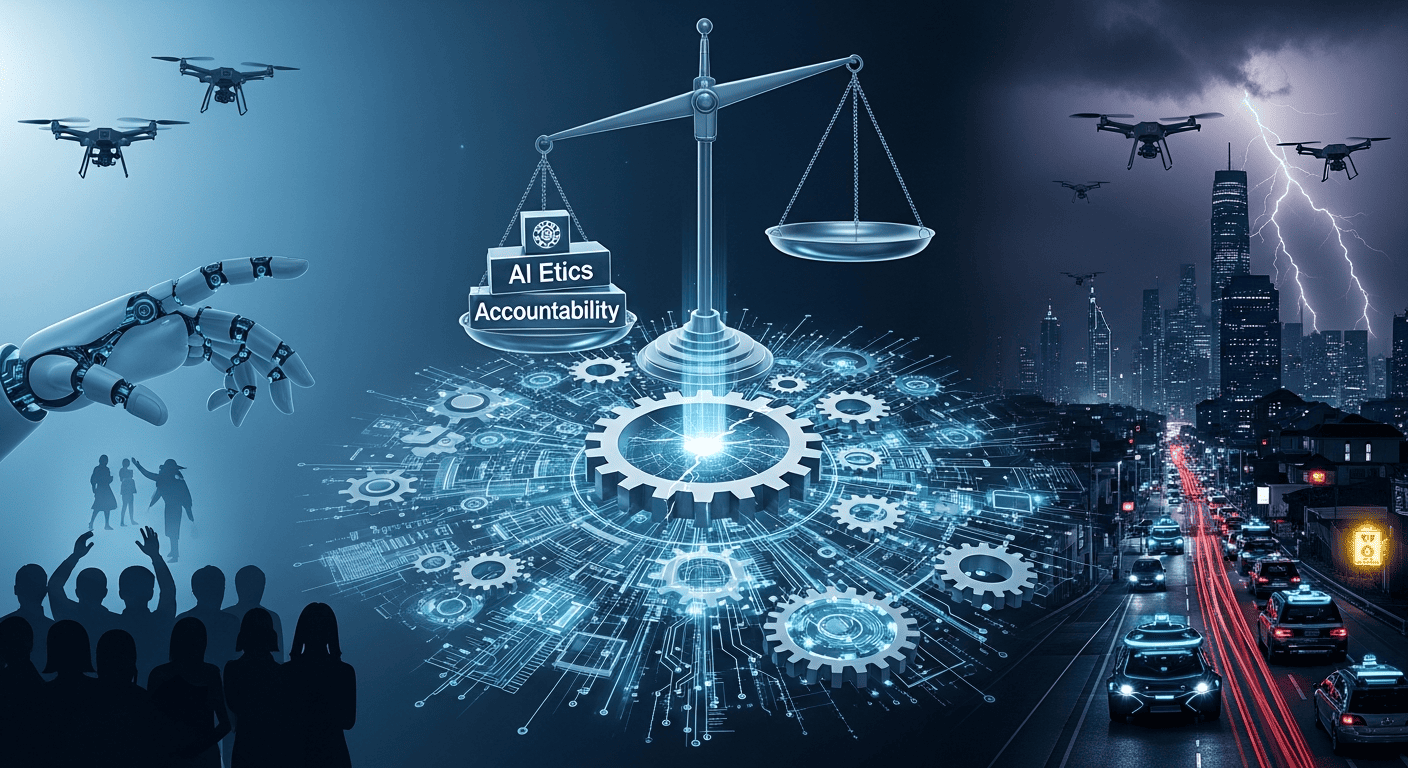AI Ethics in Autonomous Systems: Why Accountability Can’t Wait

Why AI Ethics in Autonomous Systems Now Matters More Than Ever
Autonomous systems—self-driving cars, surgical robots, delivery drones, predictive policing tools, and AI copilots—are moving from experimental to everyday infrastructure. As these technologies gain autonomy and authority, the ethical stakes have sharply escalated. The world now faces a pivotal question: How do we ensure machines that make critical decisions remain safe, fair, and accountable?
The urgency stems from several converging events: safety lapses in autonomous vehicles, biased decision models in public systems, and increasing calls for robust AI regulation. Governments, corporations, and civil society are all grappling with how much power to give AI—and what guardrails are necessary to protect people. This moment marks a turning point in how humanity chooses to govern intelligent machines.
How We Reached This Ethical Crossroads
The concept of autonomous systems dates back decades, but the last 10 years have propelled them into real-world environments. Improvements in deep learning, reinforcement learning, and sensor fusion have transformed machines from tools needing supervision to actors capable of real-time decision-making.
Self-driving cars shifted from controlled test tracks to public roads. Smart weapons moved from hypothetical debates to live military discussions. AI-driven medical diagnostics began outperforming traditional screening tools in certain cases. Yet with autonomy comes unintended consequences—biases embedded in datasets, unpredictable edge cases, and a lack of transparency in how complex models arrive at decisions.
As industries raced toward automation, ethical frameworks lagged behind. Today, that gap is finally receiving the scrutiny it deserves.
What Leaders Are Saying About AI Autonomy
Industry analysts, ethicists, and corporate leaders widely agree: the future of autonomous technology depends on trust.
Dr. Marisa Grant, AI ethics researcher at the Global Digital Policy Institute, notes, “Autonomy without accountability is simply unacceptable. If we cannot explain why an AI system acted a certain way, it has no place in high-stakes environments.”
Several tech executives echo the need for transparency. Rahul Mehta, CTO of an autonomous mobility startup, explains, “The more intelligent the system becomes, the more predictable it needs to be. Ethical design isn’t optional—it’s a market requirement.”
Even regulators are weighing in. A senior official involved in drafting EU AI Act guidelines commented that autonomous systems represent “a new frontier of responsibility,” requiring mandatory safety certifications and clear liability frameworks.
A Global Race for Ethical AI
Different regions are taking dramatically different approaches to ethical AI:
- European Union: Leading with the EU AI Act, which enforces classification of high-risk AI, mandatory transparency, and strict penalties for non-compliance.
- United States: Slower regulatory pace but accelerated industry-driven standards led by NIST and major tech companies.
- Asia (Japan, South Korea): Focus on AI reliability and robotics ethics, emphasizing safety over restriction.
- China: Prioritizes centralized control and algorithmic governance, with stringent oversight of public-facing AI.
These varied approaches shape how fast autonomous technologies can scale—and under what ethical boundaries.
Implications & Why It Matters: Ethics as the New Competitive Advantage
Ethical AI isn’t just a regulatory checkbox—it’s becoming a differentiating factor for businesses and governments.
For consumers, trust becomes the deciding factor: Will people step into a driverless taxi or trust autonomous medical systems if they cannot see how decisions are made?
For enterprises, ethical lapses can bring financial, reputational, and legal damage. The market now rewards companies that invest early in safety, auditability, and fairness.
For society, the stakes are profound. Autonomous systems influence who gets medical care, who receives loans, how cities manage public safety, and how militaries operate. Ethical missteps at scale could amplify inequalities or introduce new risks far beyond individual errors.
What’s Next: The Road to Responsible Autonomy
The next decade will bring stronger global regulations, standardized ethical frameworks, and major advancements in transparency tools like explainable AI (XAI). We’ll see:
- Built-in ethical compliance layers within autonomous systems
- Real-time audit logs for decision-making
- Mandatory safety certifications for high-risk industries
- Hybrid human-AI decision models to ensure oversight
- Greater public involvement in shaping AI governance
As autonomy expands, the world must adopt a “safety-first, transparency-always” mindset.
Our Take
Autonomous AI marks one of the most transformative shifts in modern technology, but its power demands discipline. Ethical guardrails aren’t barriers—they are foundations enabling innovation to scale responsibly. As autonomy becomes the norm, the winners will be those who treat ethics not as a constraint but as a core design principle shaping the next era of intelligent systems.